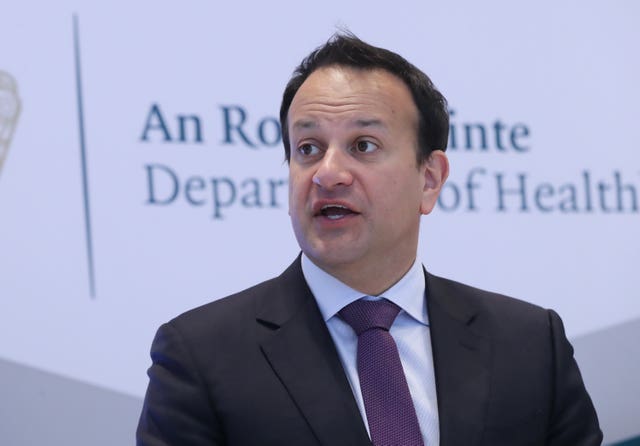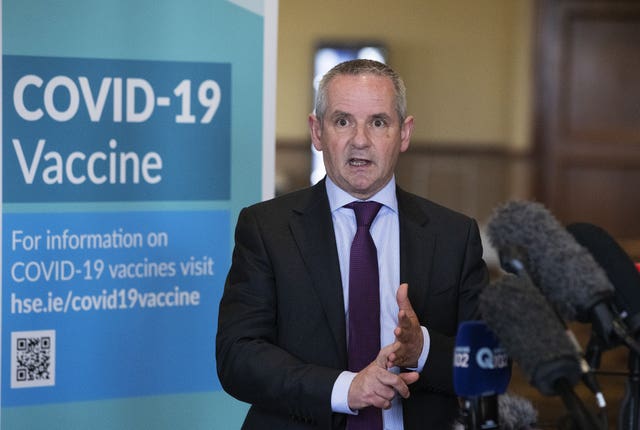Ireland’s health service has closed down its IT services following a ransomware attack by “international criminals”, the Tanaiste has said.
The HSE said on Twitter that the temporary shutdown was a “precaution”.
Leo Varadkar said the attack was “very serious” and could affect systems throughout the weekend and into next week.

He said: “It’s coming at a time when the health service is extremely busy doing lots of other things.
“It’s going to be a very difficult time for the health service.
“I spoke to the HSE this morning and also Eamon Ryan, the minister responsible for cyber security.
“It is a situation that’s still evolving.
“There’s lots we don’t know but it appears to be a ransomware attack by international criminals.
“The problem could run through the weekend and into next week, unfortunately.”
Mr Varadkar said emergency services, ambulance services, GP systems and pharmacy systems are not affected.
But he said there will be “major problems” relating to radiology services, radiation oncology, elective surgeries, and obstetrics and gynaecology appointments.
Mr Varadkar added: “The advice that we’re giving people is that, if you have an appointment, to keep that appointment.
“Don’t contact us, we’ll contact you and let you know.”
Chief medical officer Dr Tony Holohan said the issue had extended to the Department of Health, with staff left unable to access emails.
He said the ability to arrange testing would be compromised, but reiterated the need to stick to the public health advice on washing hands, mask wearing and social distancing.
He said: “Let’s not let it distract us from the basic public health messages. People can still come for testing.
“The HSE is putting in place arrangements whereby the referral process, having been interrupted from GPs, can come directly to walk-in centres to be tested.”
He added: “It interrupts our ability to be able to efficiently for example, organise testing and refer or to generate information and put that back in.
“So I don’t know when that’s going to be resolved.
“I’m not in any position to make a guess as to how long that’s going to take.
“That’s going to impede our ability to know the total number of cases that might arise over the course of a day.”
A tweet sent from the HSE account on Friday afternoon urged all staff to switch off their electronic devices.
It said: “Reminder to HSE staff: do not turn on your work PC or laptop.
“If you have your PC or laptop turned on, please power it off.”
The attack was discovered overnight and has affected all of the HSE’s national and local systems, chief executive Paul Reid said.
There is a significant ransomware attack on the HSE IT systems. We have taken the precaution of shutting down all our our IT systems in order to protect them from this attack and to allow us fully assess the situation with our own security partners.
— HSE Ireland (@HSELive) May 14, 2021
Systems for GP and close-contact Covid-19 test referrals are among the services affected.
The online system for making child protection referrals to the child and family agency, Tusla, is also down.
The Master of Dublin’s Rotunda Hospital, Professor Fergal Malone, asked women not to attend appointments scheduled for Friday, unless they are over 36 weeks pregnant, or in an emergency.
Mr Reid said people with outpatient appointments in other hospitals should still attend “unless and until” they hear otherwise from the HSE.
In addition, the Covid-19 vaccination programme has not been affected and people are urged to attend and book appointments as normal.
Mr Reid said: “We have been the subject of a very significant, major ransomware attack.
“It’s a very sophisticated attack. It is impacting all of our national and local systems that would be involved in all of our core services.
“We did become aware of it during the night and have been acting on it straight away. The immediate priority is obviously to contain this.”

Mr Reid told RTE’s Morning Ireland the health service was hit by a “human operated ransomware attack”, where hackers gain access to data and then seek a ransom for it.
He said no ransom demands have yet been received.
The HSE shut down many of its major systems as a precautionary measure and is being supported by national cyber security teams, including Gardai, the defence forces and third party support teams.
“As the morning progresses we’ll get greater clarity on the issue and greater clarity of the impacts and greater clarity of next steps we are taking,” Mr Reid added.
Scheduled COVID-19 tests will go ahead as planned. Please attend if you have an appointment. pic.twitter.com/CvhMGTA9vx
— HSE Ireland (@HSELive) May 14, 2021
He said the coronavirus vaccination programme is unaffected.
“I do want to reassure everybody this morning that the vaccination programme continues.
“It’s not impacted,” he said.
“So everybody should still come forward.”
He added that life-saving equipment, such as that used in intensive care units, has also not been affected.
“This is more or less information technology systems and transferring information across networks,” he said.
Rotunda Critical EmergencyDue to a serious IT issue all outpatient visits are cancelled today – unless you are at 36 weeks pregnant or later. All gynae clinics are cancelled today.If you have any urgent concerns please attend as normal.
Further updates will follow.
— The Rotunda Hospital (@RotundaHospital) May 14, 2021
The Rotunda’s Prof Malone said: “There’s no problems for patient safety.
“But, as a precaution, we’re asking all patients who have appointments today to not attend the hospital unless it’s an emergency, or unless they’re 36 weeks pregnant or over.
“All equipment is all absolutely operational and fine.
“Computers logging into electronic healthcare records is the issue, and the ability to access patient demographics, things like that, computer-based systems.
“They’ve all been taken offline as a precaution.
“We have systems in place to revert back to what you might call old-fashioned paper-based record-keeping.
“But, as you can imagine, when a new patient arrives at the front door of the hospital, traditionally you type in her name into a computer and get all of her details.
“That can’t happen.
“So we have to do that by paper, as patients come through the front door, (so it) will be much slower than normal.”
National IT issue update at The NMH.
We ask our patients to please attend the hospital for their appointments as scheduled. Patients can expect some delays due to the ongoing IT issue.
We very much appreciate your support and cooperation. pic.twitter.com/73oPeCdZnv
— The National Maternity Hospital (@_TheNMH) May 14, 2021
The National Maternity Hospital in Holles Street also warned of “significant disruption” due to the attack.
Liz Canavan, assistant secretary general at the Department of the Taoiseach, said: “Tusla systems are also currently not operating and this includes email, internal systems and the portal through which child protection referrals are made.
“Again, this measure is for security reasons, as the agency is hosted on the HSE ICT network.
“Any person wishing to make a referral about a child can do so by contacting their local Tusla office in their area.”




Why are you making commenting on The National only available to subscribers?
We know there are thousands of National readers who want to debate, argue and go back and forth in the comments section of our stories. We’ve got the most informed readers in Scotland, asking each other the big questions about the future of our country.
Unfortunately, though, these important debates are being spoiled by a vocal minority of trolls who aren’t really interested in the issues, try to derail the conversations, register under fake names, and post vile abuse.
So that’s why we’ve decided to make the ability to comment only available to our paying subscribers. That way, all the trolls who post abuse on our website will have to pay if they want to join the debate – and risk a permanent ban from the account that they subscribe with.
The conversation will go back to what it should be about – people who care passionately about the issues, but disagree constructively on what we should do about them. Let’s get that debate started!
Callum Baird, Editor of The National
Comments: Our rules
We want our comments to be a lively and valuable part of our community - a place where readers can debate and engage with the most important local issues. The ability to comment on our stories is a privilege, not a right, however, and that privilege may be withdrawn if it is abused or misused.
Please report any comments that break our rules.
Read the rules here